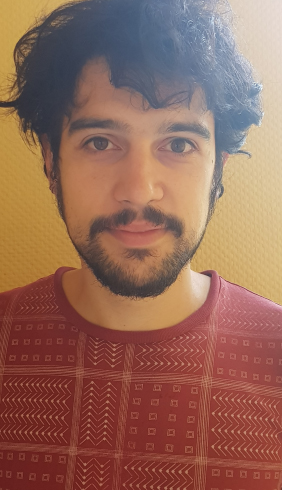Javier Esteves, Argentinian entrepreneur living in Aarhus, Denmark, has engaged into a social project called ”The New Creative Tenants”, where a group of 12 homeless Danish youngsters will start living in a cultural center called UngdomsKulturHus (UKH), as part of an experiment for social inclusion. Throughout this process, the main idea is to sort things out when it comes to the guidelines and space availability of the house, with an agenda of both active and possible projects for the new tenants to be aware of this right away.
Javier was selected for the project “European Youth at the frontlines of active citizenship: A Roadmap towards a collective South-North-East-West Momentum” organized by Volunteers Centre Skopje and supported by European Commission due to Erasmus+ European Youth Together programme.

What triggered you to start thinking about this project?
– I am very involved in a cosmopolitan organization called C-Cube, which I co-founded with my friend Jonatan, early on in 2020. One of our main preocupations was to boost the visibility of cultural hubs, centers and incubators, which generally are overlooked by the big, traditional institutions (like governments, corporations, funds, the media, etc.). While looking for ways to do so, we realized that the scope of activities that a cultural organizations tends to be related to is actually much more narrow than what really happens (and what could happen). That is already diminishing for this segment of society. Then, we found out that a department of the Aarhus Kommune, alongside with representatives from UKH, where trying to coordinate an experimental project, where a group of recent homeless youngsters would be invited to live in the cultural center as an alternative way to enhance their re-inclusion in society. We knew that that was a call to us.
What is the purpose of the project?
– Initially, to help some of the coordinators in UKH to organize the efforts and core values of the house members, towards welcoming the new tenants. Throughout this process, the main idea is to sort things out when it comes to the guidelines and space availability of the house, with an agenda of both active and possible projects for the new tenants to be aware of this right away. Later in September, the new tenants will move in, which also means that the second part of the project will take place, when the both the actually members and them will start working together as a way of including the new tenants. My position in all this as project leader is to keep the cross-communication smooth, while enlarging our network of collaborators, while looking for financial support and documenting the progress of the whole project.
What do you think this project will change?
– I will certainly keep working on putting the experimental side of this project out there in our community, with updates and open-calls for as many people interested in this initiative to partake in different levels. I think that one thing that will change for sure, is the perception that a large part of the population has in regards of the capacity and deliverables that a cultural hub have. These are not only places for hobbies, art clubs and leisure, but also incubators of future profesional creatives that are also concern with social value and the ethics behind a project.
What age is the target group?
– For bureaucratic reasons, we are aiming at an age group ranging between 18 to 30 years old. Nevertheless, and this is an edge in our project, having a group of like-minded adults participating and mentoring on each step of the project is also crucial, since this is one of the tragic obstacles of our time: youngsters and grown-ups are dislocated in too many levels, and an indispensable amount of mentoring and synergy is given away because of these gaps.
Do you think that people will follow and help you with your project?
– Absolutely. On the one hand, I am working with groups and individuals that resonate deeply with this type of initiatives, where discovering new aims and shapes form the social value of our community is their main motivation. On the other hand, Aarhus is a city with a strong foundation of solidarity, co-creativity and a sense of middle-class peacefullness, so there are a lot of people eager to give a hand in order to keep our community content and collaborating.
Do you have something to say to people that want to change something but are not very motivated?
– I think that my best advice as of today would be a reminder: change belongs to nobody in particular, but to all living things. If you shy away from changing things that resonate with you beyond any intellectual stance, then most likely you are in for a deep frustration. Conversely, if you follow the intuition of change by reaching out to other like-minded people, the worst that can happen is a valuable lesson, that will also enrich your perception of yourself and the reality you are in.
Javier Esteves

